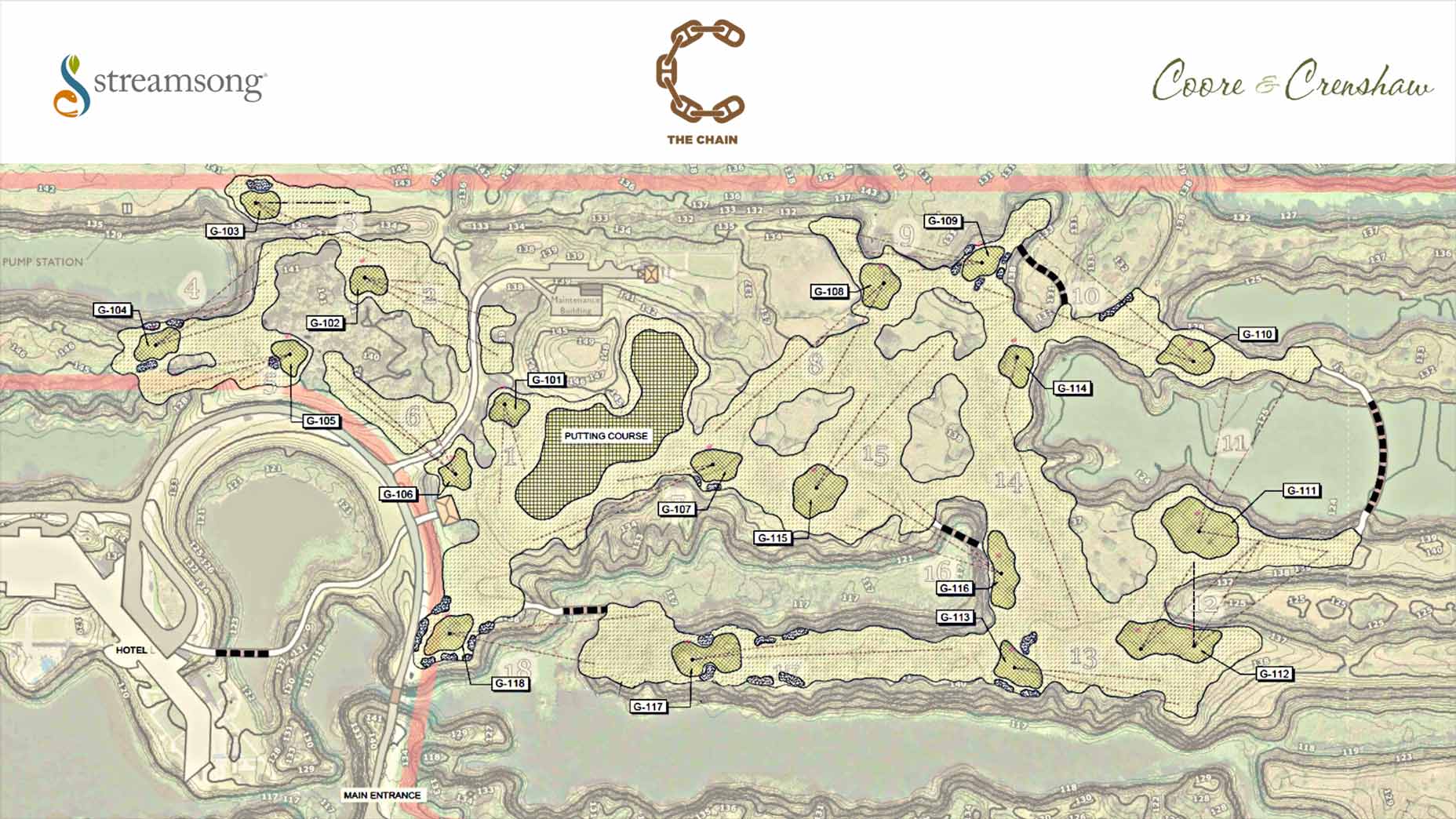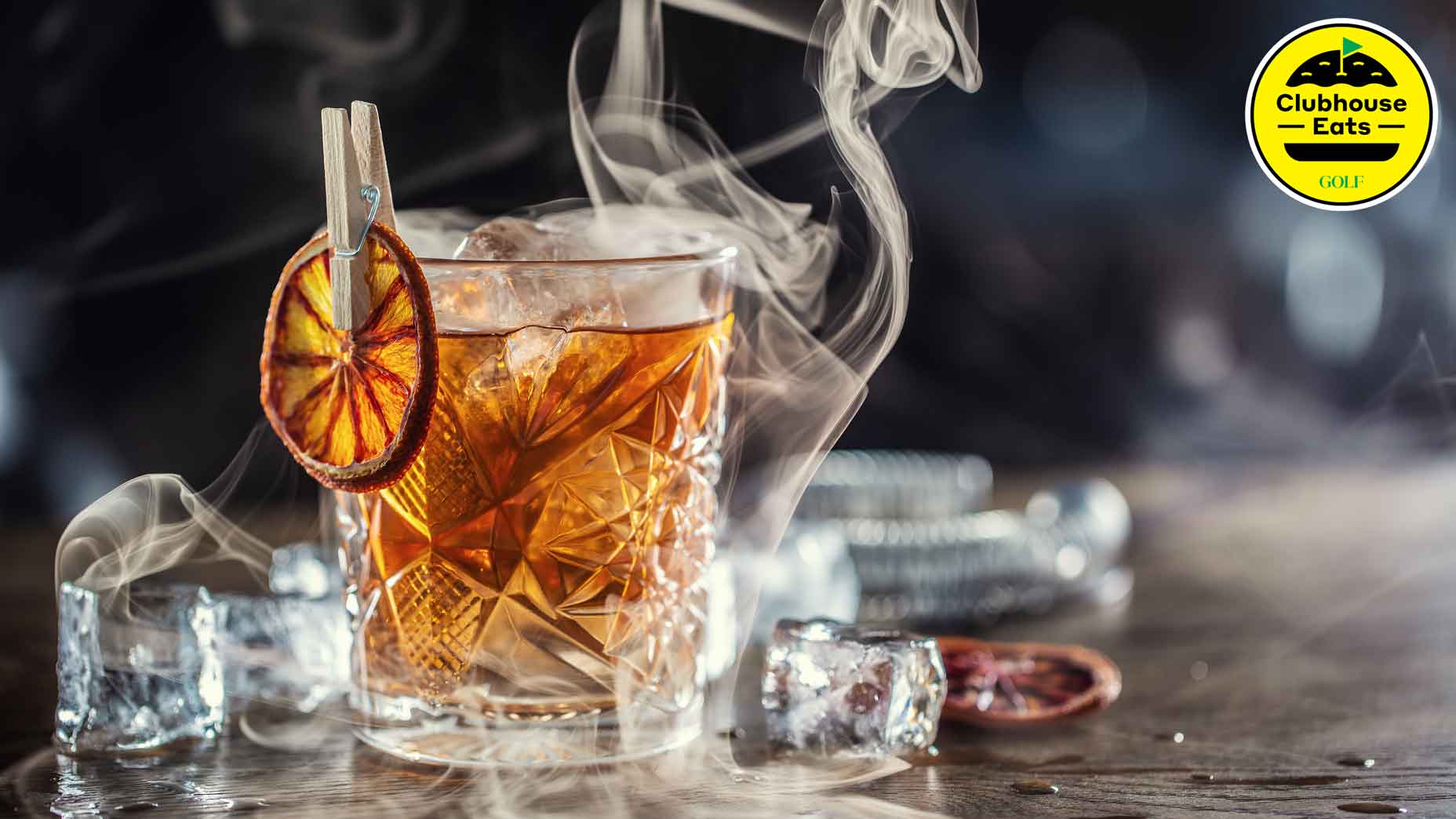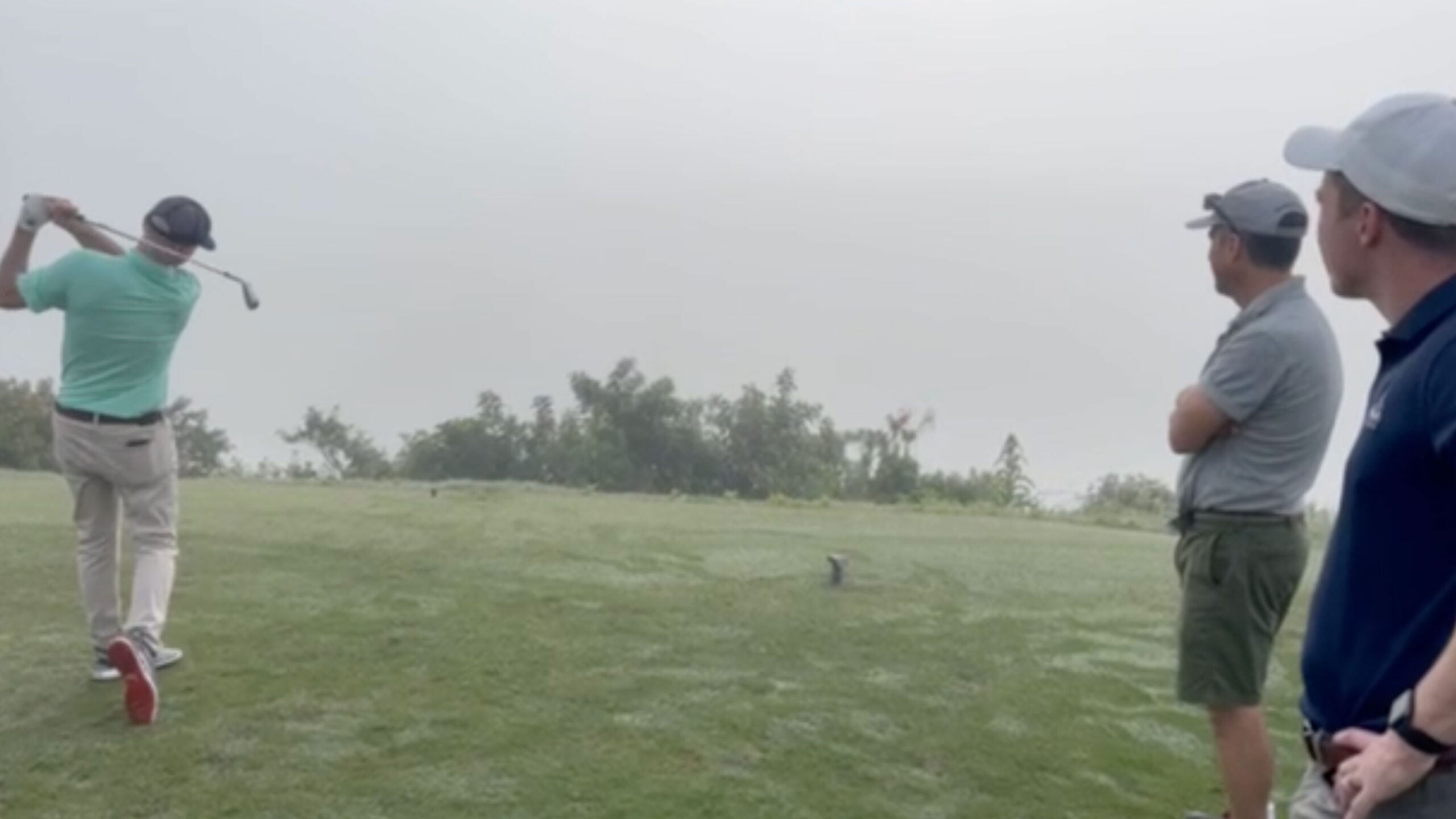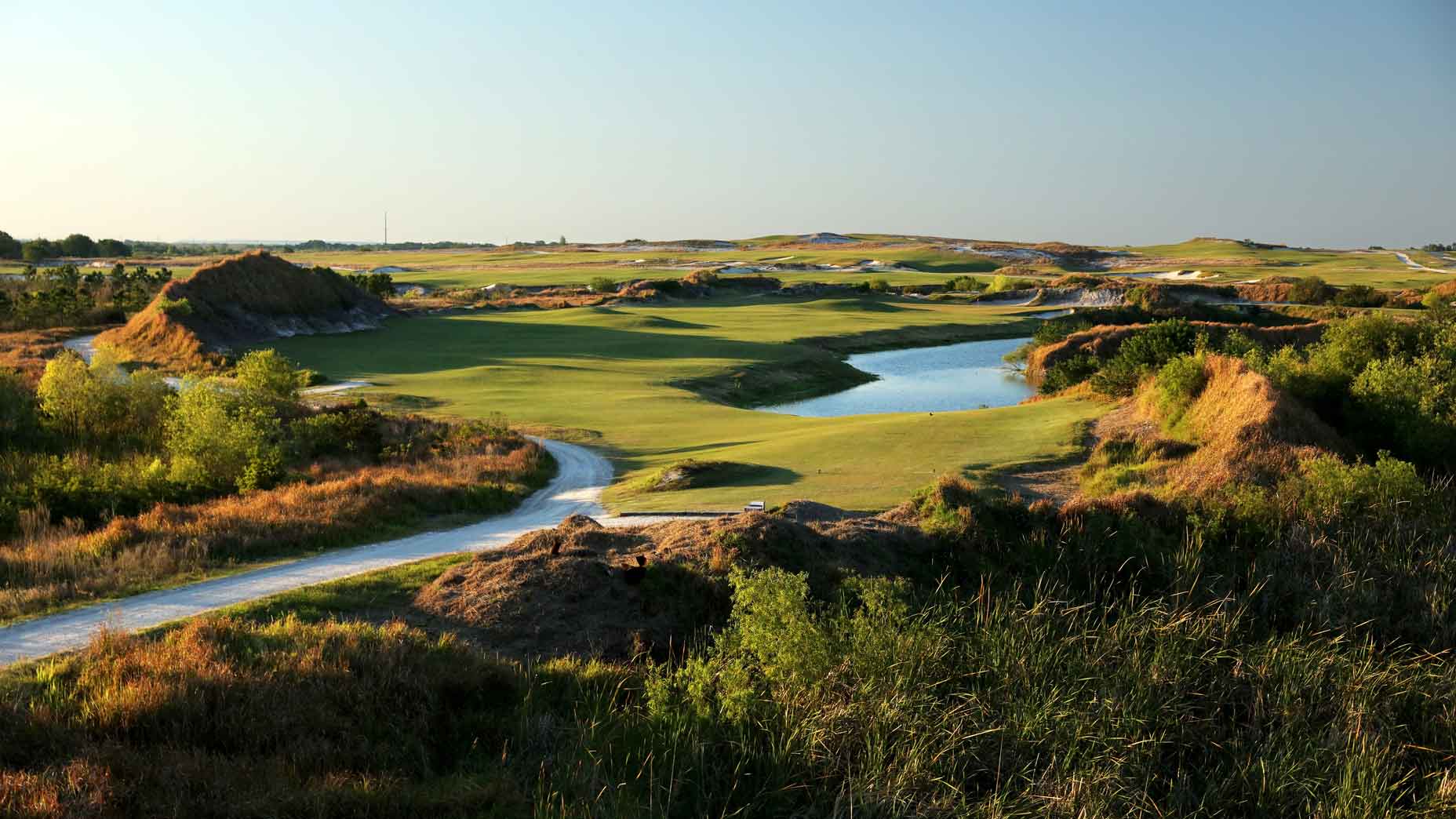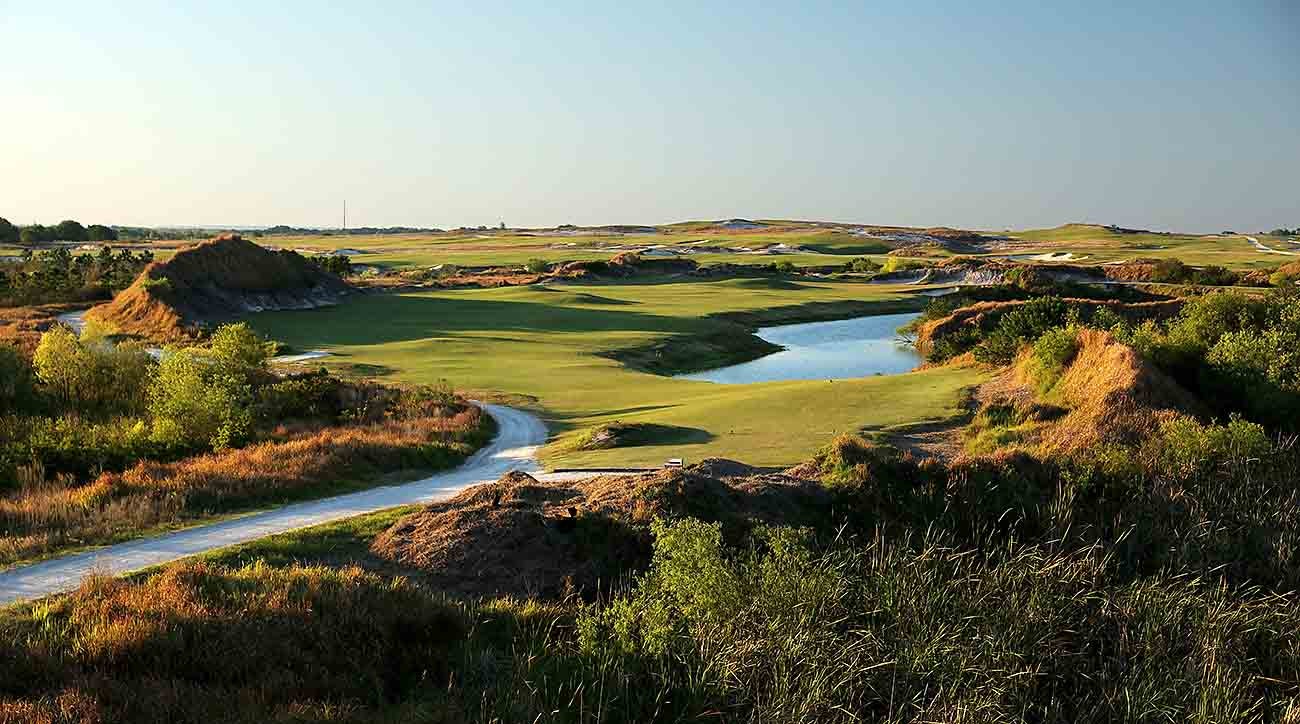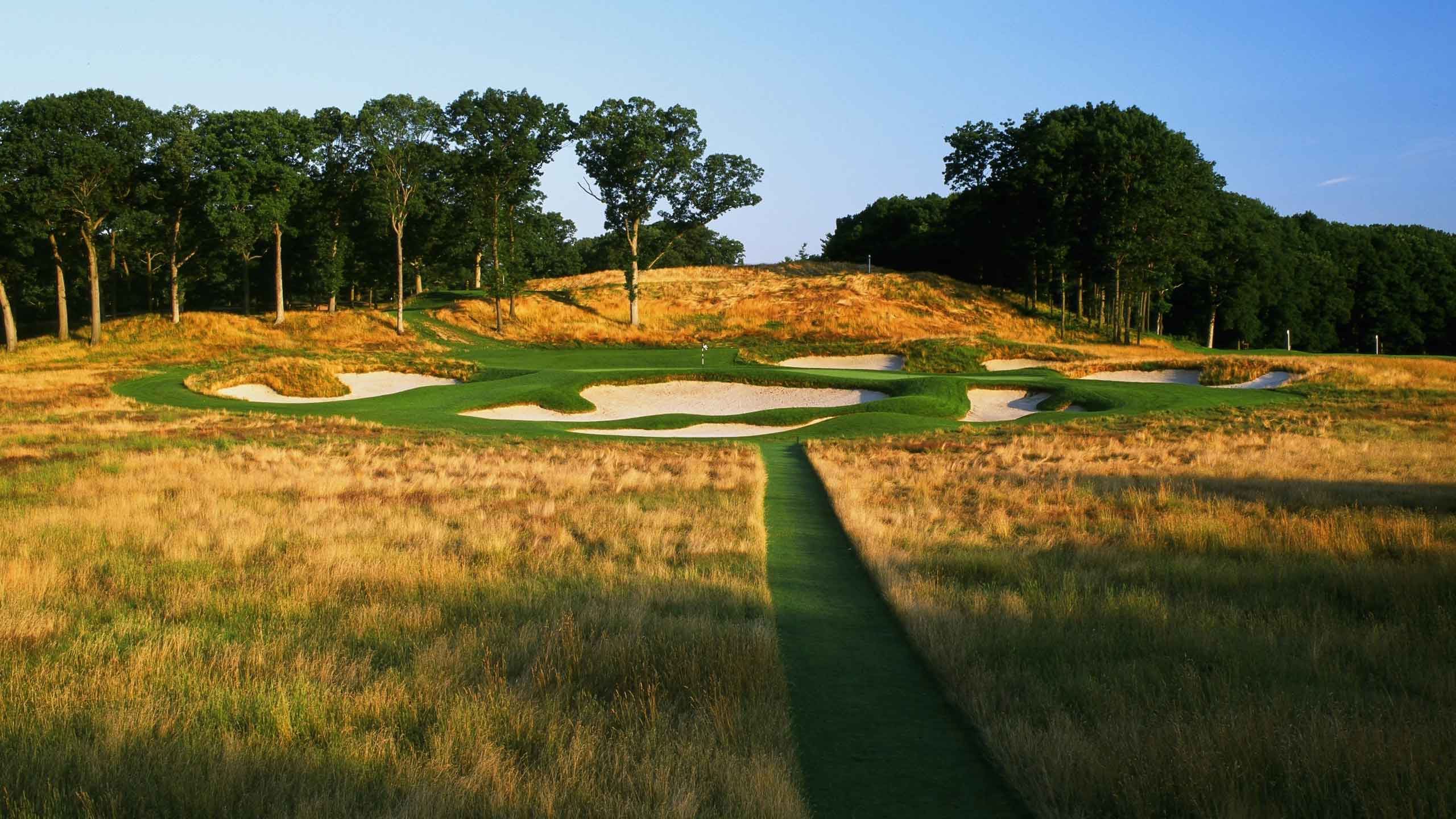Welcome to “Carry On,” a new GOLF.com travel series in which our experts take you behind the scenes of getting to and experiencing golf’s ultimate destinations.
***
Golf. Fishing. Shooting.
It sounded like a triathlon for Tour pros.
But why should they have all the fun?
And so it was decided that four ordinary duffers would indulge in those diversions, a quartet of GOLF colleagues converging from four different cities. We’d make it a friendly competition: three days to see who could bag the most birdies, land the largest bass and blast the most clay pigeons from the sky.
We’d do it all in one place, a single destination sweetly suited to our purpose.
GPS set for Streamsong Resort.
If you’re into golf, you’ve heard of Streamsong, that most un-Florida-like of Florida resorts, 50 miles from Tampa, 90 miles from Orlando and a world removed from both. The expansive property — 16,000 acres for those keeping score — spreads across the rumpled remains of a phosphate mine, heaving with dunes and kissed by wetlands: a touch of Scotland in the Sunshine State.
When it opened, in 2012, Streamsong had two 18-hole courses, the Blue and the Red, designed, respectively, by Tom Doak, and the duo of Bill Coore and Ben Crenshaw. It has since added a third, the Black, by Gil Hanse and Jim Wagner, and a fourth offering — a 19-hole short course, The Chain, also by Coore and Crenshaw, is in the works. Accompanying this diverse golf buffet are luxe amenities and enough outdoor activities to keep Boo Weekley busy through retirement.
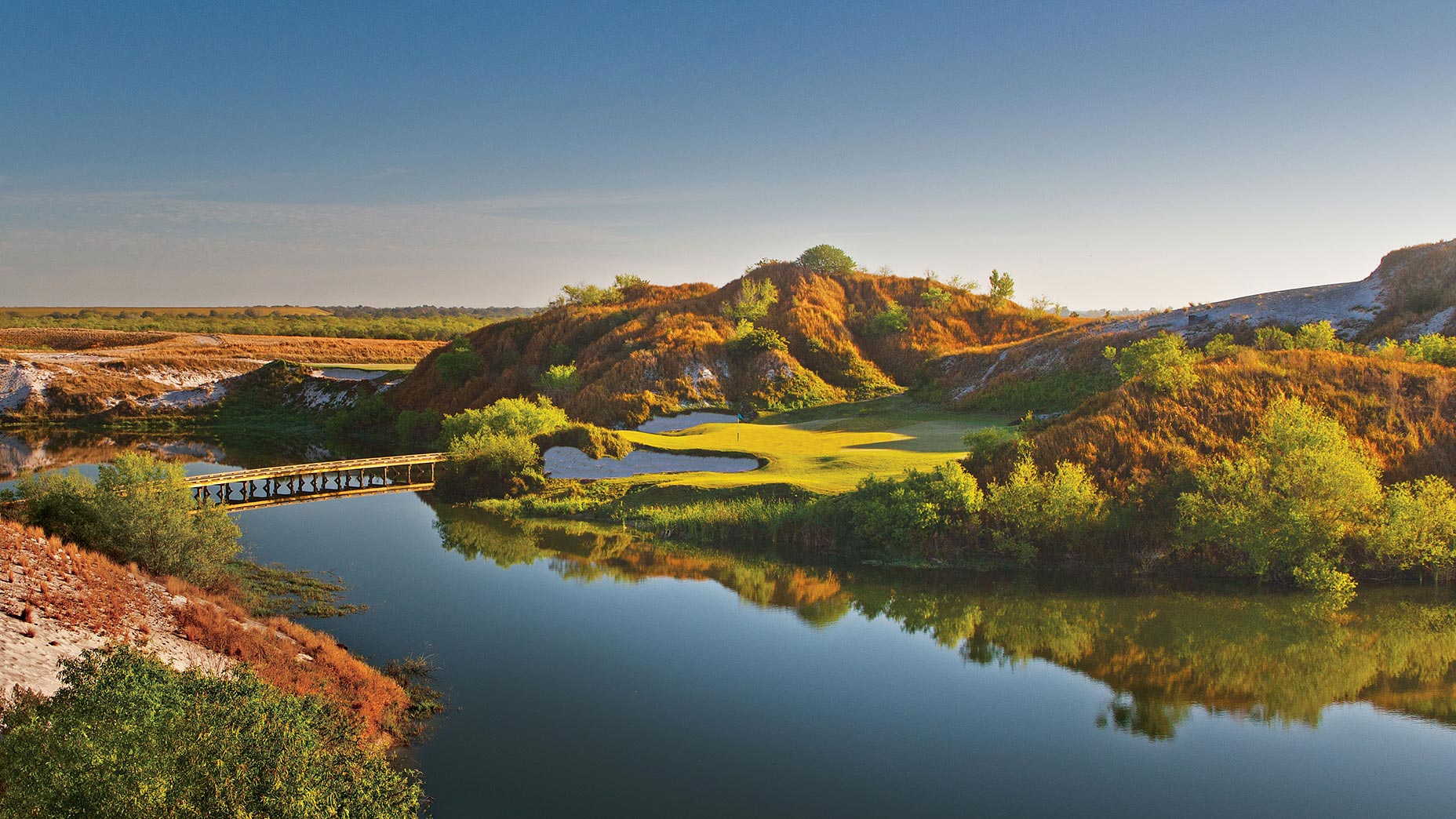
Where the golf at Streamsong is modern-minimalism — bouncy, rustic, fringed by sandy wastes — the accommodations are modern through and through. On the night of our arrival by rental car from Tampa, lights from the sleek glass-and-steel lodge beckoned in the darkness, the only landmark we could see.
The next morning, we couldn’t see much more. An uncharacteristically thick fog had blanketed the region. Caddies, always recommended on Streamsong’s strategic courses, were more vital than ever as we set out for our first round on the Red.
Like many Coore/Crenshaw designs, the Red allows for wiggle room off the tee, but proper angles are essential; the demands increase as you close in on the greens.
Instructed by our caddies to aim toward the headlights of a mower in the distance, we all found the fairway on the long par-four 1st hole, an improbable feat made possible, we figured, by the fact that we felt freed up. There’s something liberating about swinging when you don’t know where the trouble is.
As a group, we needed all the help that we could get. Our less-than-Hall-of-Fame contingent included Connor, an expert videographer who has all the shots (pull hooks, slices, blades, you name it); Darren, a multimedia guru and feast-or-famine golfer who alternates between titanic drives and dispiriting toppers; and Alan, our editor and fearless leader (except when he is quaking over three-foot putts) who dips his head so severely in his backswing that he looks like a man bobbing hastily for apples.
In this motley crew, I had the ugliest action but also, perplexingly, the lowest index. As we reached the turn, I somehow had a modest lead as well.
By then, the fog had lifted and the beauty of the landscape had filtered into view: the buckled fairways, the steep-browed bunkers, the waterways patrolled by hawks and osprey.
Aesthetically, the Red and Blue courses are kindred spirits. They are close in proximity, too, nudging up against each other at several points. One such spot is around Canyon Lake, which serves as a hazard for a pair of par 3s: the 16th of the Red and the 7th of the Blue. The latter might be Streamsong’s most photographed hole, but the former is every bit as striking, with a dramatic Biarritz green defined by a gulley that runs across it. In an instance akin to the stars aligning, all the moving parts in Alan’s swing synced up and his tee shot on the 16th found the putting surface. The hole was his to win, if only he could navigate the Biarritz. He couldn’t. With a three-putt, he let his opponents off the hook.
Maybe he’d be better at a different target game.
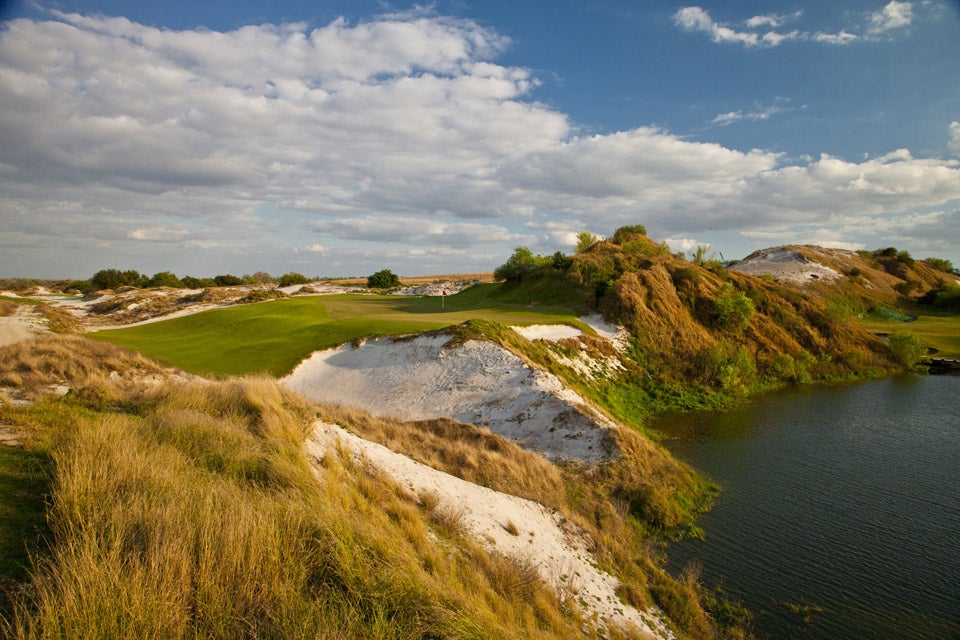
“You can use one eye if you want,” said our instructor, Eric. “But I recommend you aim with two.” It was mid-afternoon, and we’d moved on to a different Streamsong routing: a 15-station sporting clay course, stitched through wispy grasslands, a short drive from the lodge. The contest was to see who could hit the most clays in 18 tries. Since this was a first time at the sport for all of us, I assumed that the winner might get lucky and hit one.
But as Bob Rotella said of golf, shooting clays is not a game of perfect. Buckshot dispersion patterns are your friend. So are easygoing guides like Eric, who talked us patiently through technique.
Though Connor and Alan were both quick studies, Darren proved to be the dead-eye in our group, picking off five clays in his first six attempts while wearing an unsettlingly emotionless expression that made me reconsider my fondness for poking fun at him.

He was having a blast, of course. We all were, immersed in the scenery, swept up by the challenge. At each station, the clays winged in at different speeds and from different directions, zipping left, right, and over our shoulders, floating towards us and hovering like Frisbees, bounding sideways along the ground. Contrary to my forecast, we all wound up hitting our fair share of targets, and, when our time was up, we all wanted to keep going. Like flushing a drive, taking true aim at a clay was deeply gratifying, a gateway drug, of sorts, to a new sporting addiction. Now that we’d had our first taste, we might not ever feel as if we’ve had enough.
Not that we were bummed to get back to playing golf. There was plenty more of it on our agenda, including on the Blue, a wide and wildly entertaining design brimming with the nuanced demands Doak’s work is known for: the difficulty isn’t finding your ball, it’s settling on the shot that will work best next. We also had the Black, which sits apart from its two 18-hole siblings and plays distinctively as well — an expansive course with a Big Sky look and feel, and greens as large as any this side of St. Andrews.
“Fourteen holes is as far as I’ve ever seen anyone get without a three putt,” my caddie told me as we got started on the Black.
I made it through 11 before three-jacking, and I was rolling it as well as I ever have.
As tough as some putts were on the Black, they were even trickier on the Gauntlet, a 1.2-acre putting green where we played a late-day game of H-O-G — like H-O-R-S-E, in basketball, but with a hole, not a hoop. A silly game, for sure. No wonder Alan won.
The Gauntlet sits behind the Black clubhouse, a short walk from the practice range and a seven-hole, free-to-play short course called the Roundabout. We played that, too, in the gauzy glow of twilight. At Streamsong, you don’t need a tee time to make your own fun.
You do need to book ahead, though, if you want to go bass fishing. For that outing, easygoing Eric was once again our guide, piloting us out on a motorized boat onto a lake behind the lodge. It was late afternoon as we cast our lines in the placid waters of a tree-sheltered cove. A gator bobbed nearby. An osprey circled overhead. Fishing, like golf, is a flexible pursuit. It can be either solitary or social, or some combination of the two. Our group was mostly silent, except for Darren, who kept shattering the stillness by providing play-by-play on his own performance.
“Dropped it right on the edge of the lily pads!”
“Have you ever seen such a perfect cast!”
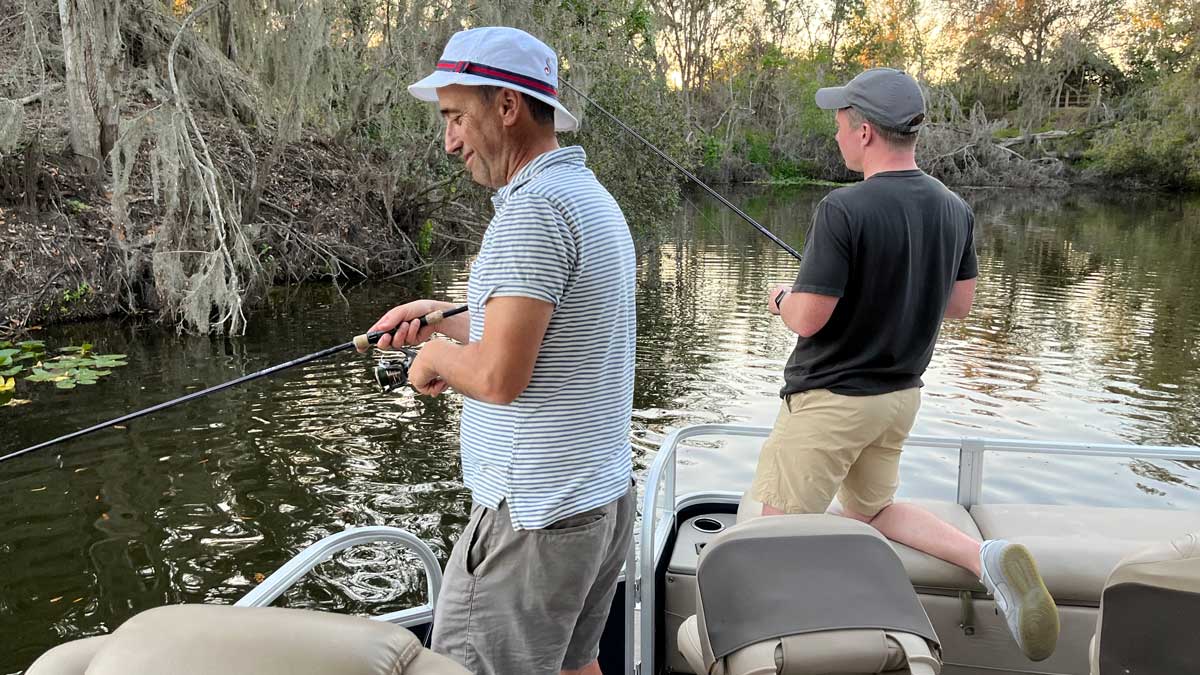
Give a man a fish, and he eats for a day. Teach him to fish, and he brags endlessly about his newly acquired skills, even if he doesn’t catch a thing.
Actually, Darren caught one fish. I did, too, though Moby Dick it wasn’t (the fishing at Streamsong is catch-and-release). Alan and Connor were both shut out, but the mood was so mellow and contented that neither seemed bothered to come up empty. For amateur anglers, one of the many delights of fishing is that it’s nowhere near as frustrating as golf.
That’s another way of saying that as competitions go, our fishing contest was not exactly fierce, and we all agreed that no one deserved to be proclaimed the winner (unless we wanted to give a prize to Eric, who pulled in so many bass that I began to wonder if he’d hired a scuba diver to place them on his line). The consolation was that we’d had a terrifically good time. And, what’s more, there was nothing stopping us from telling stories later about the ones that got away.
As for the cold, hard facts, this where is where I’ll mention that when the final points were tallied in our three-sport contest, I was named the champ. Reflecting on it now, I’m not sure how that happened. Connor had the better swing. Darren was the better marksman. And Alan did a great job of rarely whining. But the numbers don’t lie, and there are, as they say, no pictures on the scorecard, only a video, in our case, memorializing a trip in which we notched few birdies but made countless memories and had tons of laughs.
Long days outdoors lead to good nights’ sleep. On the morning of our departure from Streamsong, I rose early, well-rested, strolled into the lobby, and wound up crossing paths with a two-time Masters champ. With his design partner, Bill Coore, Ben Crenshaw was on site to push forward on The Chain: a 3,000-yard layout, just across from the lodge, with 19 holes, measuring 90 to 275 yards, and an innovative routing that will allow for six- and 13-hole loops.
After touring The Chain site that afternoon, Alan, Darren, Connor and I all made a pact to make it back to Streamsong in the fall, when the new course, is scheduled to open (with a two-acre putting green to follow ). Maybe then, we’ll compete in yet another activity that Streamsong offers: archery.
Loser has to stand still with an apple on his head.

